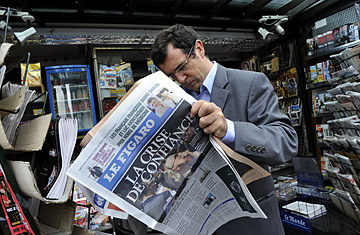
A man reads French newspaper Le Figaro in Paris
French news junkies have looked on in horror over the past few months as America's most august papers slashed staffs and in some cases morphed into exclusively online entities to weather the worst financial storm the industry has ever seen. On Thursday, however, some of that U.S. media pain hit closer to home, as French readers of the left-leaning Libération popped into newsstands to find their favorite daily nowhere to be found. The reason: managers of the financially troubled Libé decided not to publish on Ascension and five other national holidays throughout the year. It was hardly a case of religious feeling, but rather a means of eking out some savings on production costs.
French dailies traditionally publish on all holidays except the May 1 labor day. But Libération editors explained that sluggish sales on days off don't offset the cost of printing the cash-strapped paper. Rival publications reacted not with smug guffaws, but with more of the same. Conservative daily Le Figaro now says it will also suspend publication on three French holidays. That follows the earlier lead of financial dailies Les Echos and La Tribune to sit out national holidays — a sous-pinching habit to which Catholic daily La Croix and its communist opposite L'Humanité have also since subscribed. (See pictures of France celebrating Bastille Day.)
"Everyone agrees sales on these days are derisory," Le Figaro director general Francis Morel told Le Monde (which says it will continue publishing on all holidays except May 1). "The savings involved are around $135,000 per day."
That may sound like peanuts to U.S. papers loaded down with hundreds of millions in debt as they battle plummeting ad revenues and the continued advance of Internet rivals. But while French papers haven't closed down like some American ones, they do face troubles of their own. Overall daily circulation has plummeted from a postwar high of 6 million to just 1.5 million today. The financial situation of most French papers has become so dire in recent years that the government of President Nicolas Sarkozy has decided to augment annual state subsidies to the sector, which amount to between $1.5 billion to $2 billion, with an additional $900 million over the next three years. (See pictures of Sarkozy in the U.K.)
Sarkozy has also proposed luring younger people to newspapers by offering to pay for home delivery of any title of their choice for one day a week during the year of their 18th birthday. Since such schemes aren't likely to do the trick for French papers, it makes sense for publishers to search for ways to eliminate costs before they occur. After all, the free handout dailies — another source of woe for traditional papers — long ago stopped publishing during year-end holidays and summer vacations, when readership volume dropped.
"The pressure they've come under from free papers has led dailies to consider similar practices as they seek to react to falling ad revenues and the threat from the Internet," says Jean-Clément Texier, a media expert and founder of the Compagnie financière de communication consulting group in Paris. "Of course, readers initially react by saying it's a terrible move that breaks French tradition and deprives them of their paper. But since a huge portion of French dailies come in the morning mail — which doesn't operate on holidays — will anyone really miss getting those obsolete papers a day late?"
Probably not, since papers offer full news coverage anyway on their websites, as Libé did Thursday. That migration to the Web risks trapping French dailies in a dilemma their U.S. peers are already caught in: a proliferation of Internet-savvy readers unwilling to pay again for the original paper product. Indeed, Texier thinks whatever its current agony, the U.S. newspaper industry stands a better shot of coming out of this period alive than its French counterpart. (Read "How to Save Your Newspaper.")
"Although American papers are facing a direr situation at the moment, their managers have been so much more flexible and innovative in responding than France's rigid media," Texier says. "Besides, American dailies started with far bigger markets and much more money than French papers did, so their margin for recovery is larger too." That may leave the French wishing they could go even further in promoting a peculiarly Gallic solution: more holidays.
